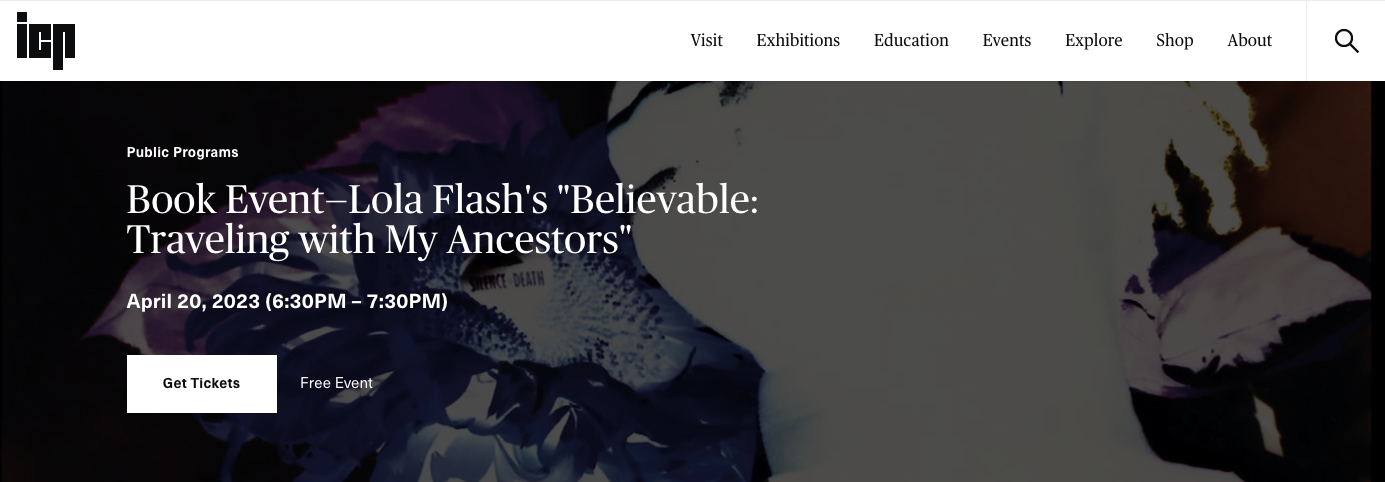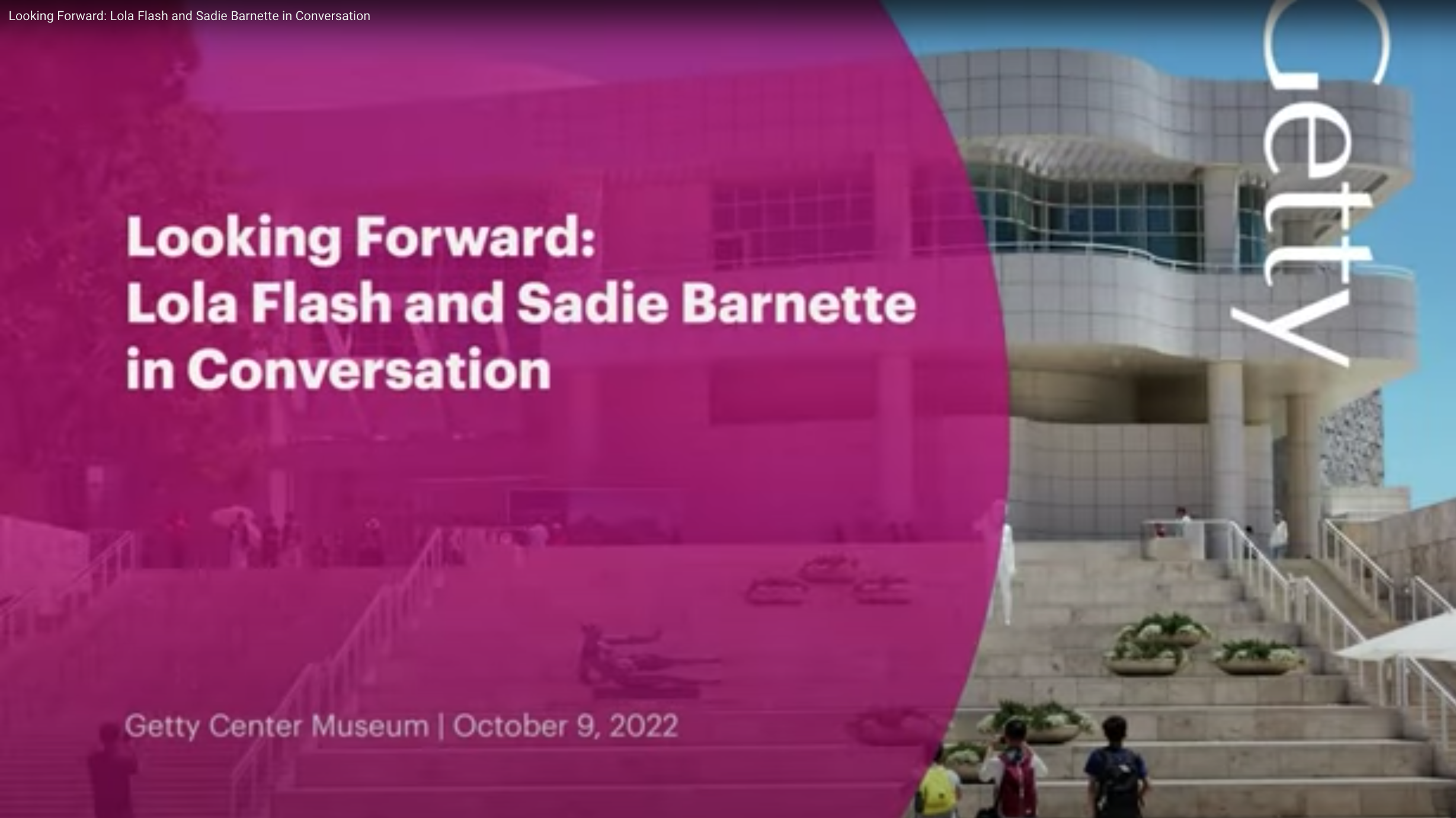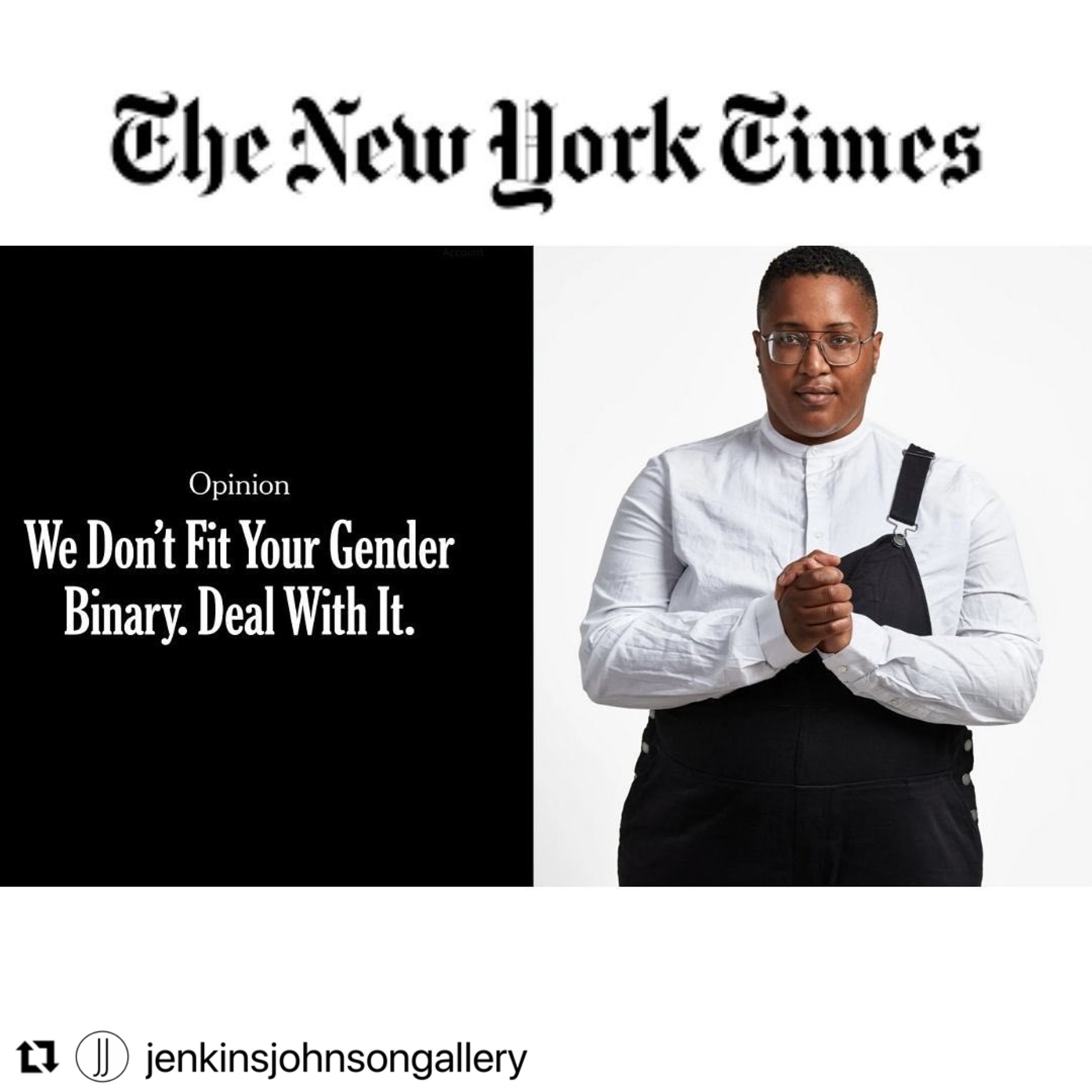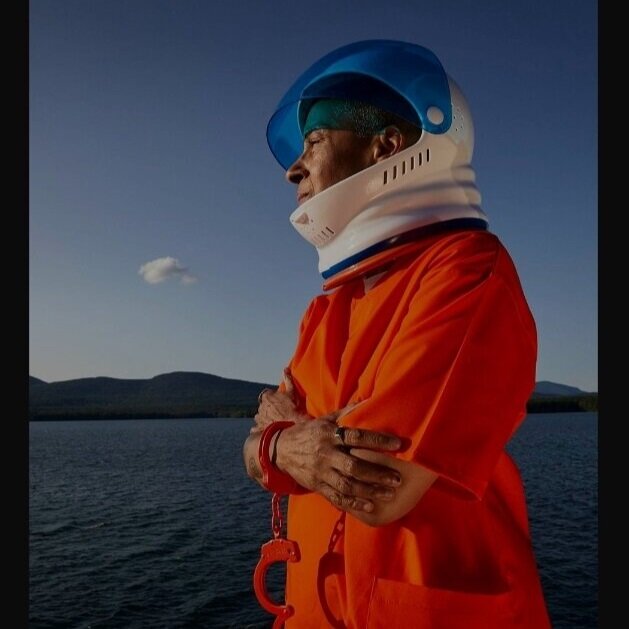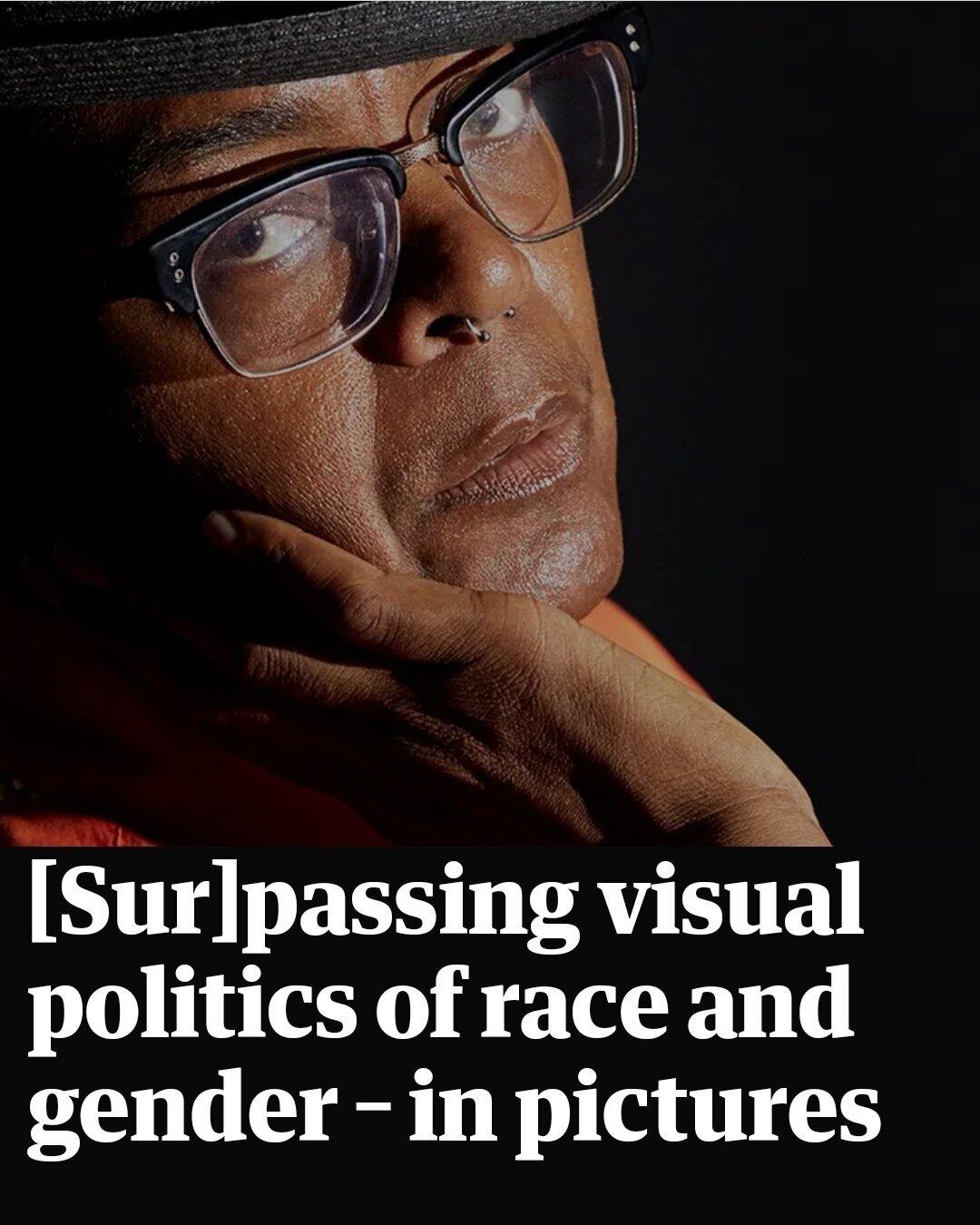With the backing of the Pollock Krasner Foundation, I am embarking on a journey to Senegal and beyond to photograph ‘syzygy, the vision’. This grant serves as a catalyst, enabling syzygy to connect the present with the past, while venturing into the future.
Book Event—Lola Flash's "Believable: Traveling with My Ancestors"
This event is free with Late Night ICP $5 museum admission.
During Late Night ICP, Lola Flash joins journalist Jenna Wortham for a conversation celebrating the release of Flash’s book Believable: Traveling With My Ancestors (New Press) which acts as a survey of Flash’s decades-long career as a pioneering queer artist.
This program is being offered both in person at ICP, located on NYC's Lower East Side, and online.
About Believable: Traveling With My Ancestors
The 17th volume in a groundbreaking series of LGBTQ-themed photobooks from The New Press, Believable draws on the extraordinary body of work that Flash has created over four decades, from their iconic Cross Colour images from the 1980s and early 1990s to their more recent photography, which used the framework of Afrofuturism to examine the intersection of Black culture and technoculture and science fiction. Also included in the book are portraits that explore the impact of skin pigmentation on Black identity and consciousness, as well as people who have challenged traditional concepts of gender and trendsetters in the urban underground cultural scene.
About the Speakers
Working at the forefront of genderqueer visual politics for more than four decades, photographer Lola Flash’s work challenges stereotypes and gender, sexual, and racial preconceptions. An active member of ACT UP during the time of the AIDS epidemic in New York City, Flash was notably featured in the 1989 “Kissing Doesn’t Kill” poster. Their art and activism are profoundly connected, fueling a life-long commitment to visibility and preserving the legacy of LGBTQIA+ and communities of color worldwide. Flash has work included in important collections such as the Victoria and Albert Museum in London, MoMA, the Whitney, he Museum of the African American of History and Culture and the Brooklyn Museum. They are currently a proud member of the Kamoinge Collective, and on the Board of Queer Art.
Flash received their bachelor's degree from Maryland Institute and Masters’ from London College of Printing, in the UK. Flash works primarily in portraiture, engaging those who are often deemed invisible. Flash’s practice is firmly rooted in social justice advocacy around sexual, racial, and cultural difference.
J Wortham (they/them) is a sound healer, reiki practitioner, herbalist, and community care worker oriented towards healing justice and liberation.
J is also a staff writer for The New York Times Magazine, and co-host of the podcast ‘Still Processing,’ They occasionally publish thoughts on culture, technology and wellness in a newsletter.
J is the proud editor of the visual anthology Black Futures, a 2020 Editor's choice by The New York Times Book Review, along with Kimberly Drew, from One World. J is also currently working on a book about the body and dissociation for Penguin Press. J mostly lives and works on stolen Munsee Lenape land, now known as Brooklyn, New York, and is committed to decolonization as a way of life.
Book Release: Believable Traveling with My Ancestors Lola Flash
Believable
Traveling with My Ancestors
With an introduction by Renée Mussai
A stunning full-color collection of photographs, old and new, by the renowned photographer and LGBTQIA+ activist Lola Flash
“To experience Lola Flash’s portraits is to come face to face, eye to eye, with a subject who will not stay on the margins or in the shadows.” —The New York Times
Working at the forefront of genderqueer visual politics, celebrated photographer Lola Flash has become known for images that manage to both interrogate and transcend preconceptions about gender, sex, and race. Spurred by their experience as an active member of ACT UP and ART+ during the AIDS epidemic in New York City, their art is profoundly connected to their activism, fueling a lifelong commitment to visibility and preserving the legacy of queer communities, especially queer communities of color.
The seventeenth volume in a groundbreaking series of LGBTQ-themed photobooks from The New Press, Believable draws on the extraordinary body of work that Flash has created over four decades, from their iconic “Cross Colour” images from the 1980s and early 1990s to their more recent photography, which used the framework of Afrofuturism to examine the intersection of Black culture and technoculture and science fiction. Also included in the book are portraits that explore the impact of skin pigmentation on Black identity and consciousness, as well as people who have challenged traditional concepts of gender and trendsetters in the urban underground cultural scene.
In all their images, their passion for photography and their belief in the medium’s ability to provide agency and freedom and initiate change shine through. For the first time, Believable brings together the remarkable work of this queer art icon.
Believable was designed by Emerson, Wajdowicz Studios (EWS).
Henry Luce Foundation Presents: (De-)Coding Queer Identity in U.S. Art Museums Today
Conversations on American Art and Museums
Featuring: Gonzalo Casals, Lola Flash, Richard Aste (moderator)
In this program, the speakers will discuss recent advances and ongoing challenges in representing Queer identities in U.S. art museums today.
The Kamoinge Workshop is a collective of Black photographers formed in New York in 1963. Its legacy continues today with members upholding the group’s mission to honor, document, preserve, and represent the history, culture, and lived experiences of the African diaspora with integrity and respect. During this conversation, Kamoinge member and photographer Lola Flash talks with multimedia artist Sadie Barnette about their unique approaches to history, our current moment, and Afrofuturism.
Speakers: Sadie Barnette’s multimedia practice illuminates her family history as it mirrors a collective history of repression and resistance in the United States. Barnette holds a long and deep fascination with the personal and political value of kin. Her adept materialization of archival materials rises above a static reverence for the past; by inserting herself into the retelling, she offers a history that is alive. Her use of abstraction, glitter, and the fantastical summons another dimension of human experience and imagination. Recent projects include the reclamation of a 500-page FBI surveillance file amassed on her father during his time with the Black Panther Party and her interactive reimagining of his bar—San Francisco’s first Black-owned gay bar.
Working at the forefront of genderqueer visual politics for more than four decades, photographer Lola Flash’s work challenges stereotypes as well as gender, sexual, and racial preconceptions. An active member of ACT UP during the time of the AIDS epidemic in New York City, Flash was notably featured in the 1989 “Kissing Doesn’t Kill” poster. Their art and activism are profoundly connected, fueling a lifelong commitment to visibility, and preserving the legacy of LGBTQIA+ and communities of color worldwide. Flash's work is in the collections of the Victoria and Albert Museum, MoMA, the Whitney Museum of American Art, Brooklyn Museum, and the National African American Museum of History and Culture. They are a proud member of the Kamoinge Collective, and on the Board of Queer Art. This program was presented at the Getty Center and Online on Sunday, October 9, 2022, https://www.getty.edu/visit/cal/event..., and complements the exhibition "Working Together: The Photographers of the Kamoinge Workshop," https://www.getty.edu/art/exhibitions...
QueerSpace: Saxophones on the Moon, Sponsored by the Smithsonian National Air and Space Museum
Anyone who’s observed the Milky Way or has seen a beautiful Hubble image can understand how space and space imagery can be a source of creative inspiration. When researching QueerSpace, we repeatedly saw creators blending themes of space and themes of queerness in their art. Many of these artists use their art to envision new futures. Futurist thinking uses the experience of the past and present to contextualize and reimagine what the future could be, often creating a future that’s more equitable and radically different than what we have now. In this episode of QueerSpace, Stamatina Gregory from the Leslie-Lohman Museum helps to contextualize the origins of this intersection of space, queerness, and futurism in art. And we hear from photographer Lola Flash and poet Nikki Giovanni on their art, inspiration, and visions of the future.
Alumni Lecture "Inside Out" with the Maine Media Workshops + College
Lola Flash featured in the NY Times, We Don't Fit Your Gender Binary. Deal With It.
Envisioning the Future, with Lola Flash in collaboration with The Answer is No Podcast
The Answer is No Podcast, Envisioning the Future, with Lola Flash
Artists’ journey are rarely predictable. For Lola Flash, as a young kid growing up in New Jersey, with a 35mm camera in her hands and a supportive mother who would soon set up a darkroom for her at home, she knew she didn’t want to wait to become a photographer. But the path to seeing her work on the walls of galleries and museums wasn’t so straightforward.
In fact, early on in Flash’s career, the overwhelming whiteness of museums left her feeling they weren’t a place she wanted to share her work at all. She also never imagined herself making conceptual work. Now, more than three decades into her career, she’s shifting her perspective on many things, and is even undertaking her first series of conceptual photographs.
In this week’s episode we’ll hear more about the journey from snapping photos of her classmates in grade school, to a possible career in scientific photography, to a 12-year detour to London, and so much more.
Our interview was recorded in October 2020.
Ebony Magazine Feature, Epic Black Image, March 2021
Same Same But Black presents ICON- 2021 v- Conversation with Lola Flash
A conversation about Lola work and photographs in ICON-2021 and why photography is so important to our community.
Telephone interview with you Host Michelle from Same Same But Black base in Auckland New Zealand. During Covid 19
Lola Flash : Photographer: Activist: Black Queer Woman
Lola Flash is a photographer who initially became known for her use of cross-colour technique, producing striking pieces of work in inverted colours. She was part of the Art Positive artist collective and during the AIDS crisis in New York City she was an active participant in ACT UP, a grassroots political group aiming to support people with AIDS and end the pandemic. Her work in often concerned with marginalized groups and topics of race, gender, age, sexuality and identity. Flash was also one of the models featured in the 1989 "Kissing Doesn't Kill" poster.

